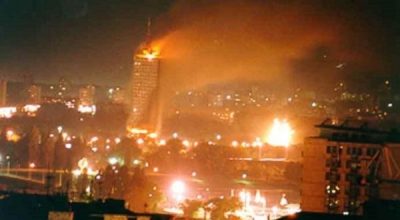Yugoslavia, 24 March 1999. The New NATO’s Founding War. “The Right of Humanitarian Interference”

All Global Research articles can be read in 51 languages by activating the Translate Website button below the author’s name (only available in desktop version).
To receive Global Research’s Daily Newsletter (selected articles), click here.
Click the share button above to email/forward this article to your friends and colleagues. Follow us on Instagram and Twitter and subscribe to our Telegram Channel. Feel free to repost and share widely Global Research articles.
Global Research Fundraising: Stop the Pentagon’s Ides of March
***
25 years ago, NATO under US command demolished with war what remained of the Yugoslav Federation, the State that hindered its expansion eastwards towards Russia. In the following twenty years, NATO expanded from 16 to 30 countries and, with the war in Ukraine that began in 2014, it expanded to 32.
In the 1999 war, the role of the Italian government, chaired by Massimo D’Alema, was crucial. As we can hear from the official audio recording, Vice President Sergio Mattarella announced the start of the war to the Italian Senate on the evening of March 24, 1999, and explained the reasons according to the official version.
While the United States and other NATO countries’ planes dropped the first bombs on Serbia and Kosovo, Democratic President Clinton announced:
“At the end of the 20th century, after two world wars and a cold war, we and our allies will be able to leave our children a free, peaceful and stable Europe”.
For 78 days, 1,100 planes took off mainly from Italian bases, and carried out 38 thousand raids, dropping 23,000 bombs and missiles.
“Of the 2000 targets hit in Serbia by NATO planes – the Pentagon later documented – the American secret services chose 1999 and only one by the European ones”.
The bombings dismantled Serbia’s structures and infrastructure causing victims, especially among civilians. The resulting health and environmental damage is not quantifiable. Due to the bombing, thousands of tons of highly toxic chemicals (including dioxin and mercury) leaked from the Pancevo refinery alone, while other damage was caused by NATO’s massive use of depleted uranium shells in Serbia and Kosovo.
The D’Alema government placed Italian territory, particularly the airports, at the complete disposal of the armed forces of the United States and other countries, to implement what the Prime Minister defines as “the right of humanitarian interference“. 54 Italian planes took part in the bombings, making 1,400 raids, and attacking the targets indicated by the US command.
“In terms of the number of planes we were second only to the USA. Italy is a great country and we should not be surprised by the commitment shown in this war” – declared Prime Minister D’Alema during his visit to the Amendola base on 10 June 1999 – underlining that, for the pilots who participated, it was a great human and professional experience.”
*
Note to readers: Please click the share button above. Follow us on Instagram and Twitter and subscribe to our Telegram Channel. Feel free to repost and share widely Global Research articles.
This article was originally published in Italian on Grandangolo, Byoblu TV.
Manlio Dinucci, award winning author, geopolitical analyst and geographer, Pisa, Italy.
He is a Research Associate of the Centre for Research on Globalization.

